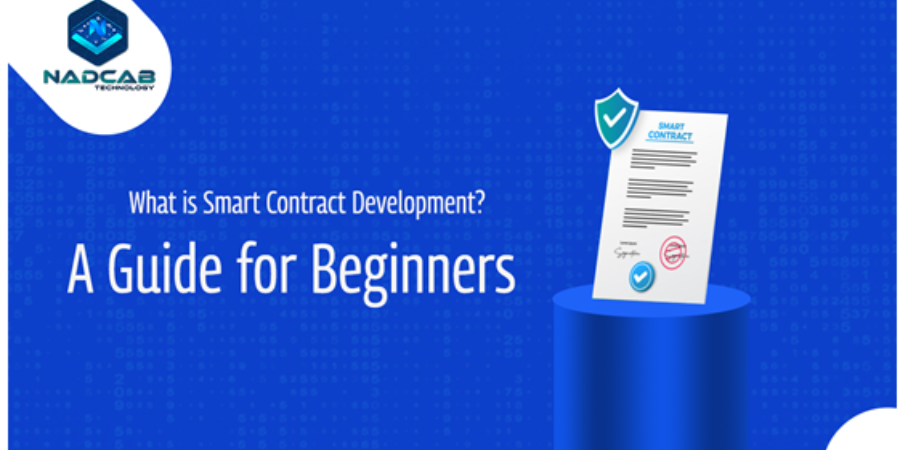What is Smart Contract Development? A Guide for Beginners

Introduction
If you’re interested in learning about smart contract development, this guide will give you the details you need to decide if it’s the right fit for your future business endeavors. Smart contracts are digital versions of contracts between two or more parties in the real world, with the terms and conditions of the contract being enforced the blockchain network instead of legal force (i.e., courts). This guide will explore precisely what smart contracts are, how they work, and what can be used to determine better if they are suitable for your next project!
What are smart contracts?
Smart contracts are pieces of code that run on blockchains to facilitate, verify, or enforce the negotiation or performance of an agreement. It can be used to define a set of rules in a computer language that executes when certain conditions are met. For example, you can create a smart contract with someone agreeing to transfer assets at some point in time in exchange for something else (like money). Smart contracts allow digital assets to be programmatically governed and traded according to pre-defined agreements. Although it seems simple, they have endless possibilities. They could be used to provide trustless voting systems, secure property rights, develop decentralized social networks, and automate supply chains.
One way smart contracts make transactions possible without third parties is through self-executing code. Once the smart contract has been fulfilled (or breached), the terms will execute automatically without any human interaction.
Why do you need them in blockchain technology?
Smart contracts are a critical aspect of blockchain technology. Blockchains have an immutable nature, which makes it possible to store information on them without fear of corruption. However, they do not make sense without smart contracts because they merely act as a place where data can be stored. Smart contracts bring meaning to blockchains enabling various applications and adding context to that data. If you want to know more about smart contract development, keep reading! You’ll find out how these computer programs work in detail and how they differ from their traditional counterparts. You’ll also learn how they operate on blockchains in addition to their key benefits and risks. Read on if you want to learn more about smart contract development—it’s an essential part of blockchain technology!
Who can create smart contracts, and who can use them?
The first question you might be asking yourself is Who can create smart contracts?
Anyone can create smart contracts, even if you have no programming experience. There are, however, different smart contract development platforms, and each has its own rules and limitations. In some cases, you might need to be an experienced programmer to create a smart contract or will only be able to use a specific platform. For example, EtherParty only supports non-programmers creating smart contracts that run on Ethereum. Meanwhile, other smart contract development platforms like Solidity don’t support advanced languages such as Python or JavaScript.
Smart contracts are, their very nature, completely autonomous and decentralized. In that sense, you might think that only individuals or companies with access to expensive and powerful computing systems can get involved in smart contract development. Fortunately, it’s not that difficult or technical of a process, as our guide will detail. Also, keep in mind that in many ways, smart contracts work similarly to traditional legal documents like wills or business agreements—the power comes from using them correctly.
Now let’s talk about who can use these Smart Contracts: As we mentioned above, any user (or company) with enough information and coding knowledge can develop a Smart Contract. So what makes Smart Contracts so revolutionary? To answer this question, we’ll go back to the original meaning of the word contract. When people hear the word contract, they usually think of written documents outlining an agreement between two parties. That definition has been evolving but still retains some fundamental truths about what constitutes a contract – mutual consent among all parties concerned. With Smart Contracts, there is no need for a mediator to verify transactions and ensure the terms are being upheld. Plus, transactions cannot be reversed. But there’s more! Smart Contracts also allow other financial services like escrow accounts and prediction markets. And because smart contracts run on blockchain technology, they’re also nearly impossible to hack!
Conclusion
Smart contracts are simply lines of code that execute an action when certain conditions are met. Anyone can develop smart contracts, but Ethereum developers will find it easiest to deploy these applications to their blockchain platform. And once you do launch your contract, it will be immutably stored in your digital ledger forever. It’s a simple way to build trust and accountability into a decentralized future.
The most popular Smart Contract Development Company in India is NADCAB Technology, which provides all the services that come under Smart Contract Development (For example – Smart Contract Design and Development, Smart Contract Auditing, and many more) with more than five years in the Blockchain market.
Find the latest updates on Twitter
I’m a leading crypto author with over 10 years experience in the industry. I have been featured in numerous publications and am a regular speaker at major crypto events. I’m also the founder of Crypto Academy, which is dedicated to providing education on all things crypto.
